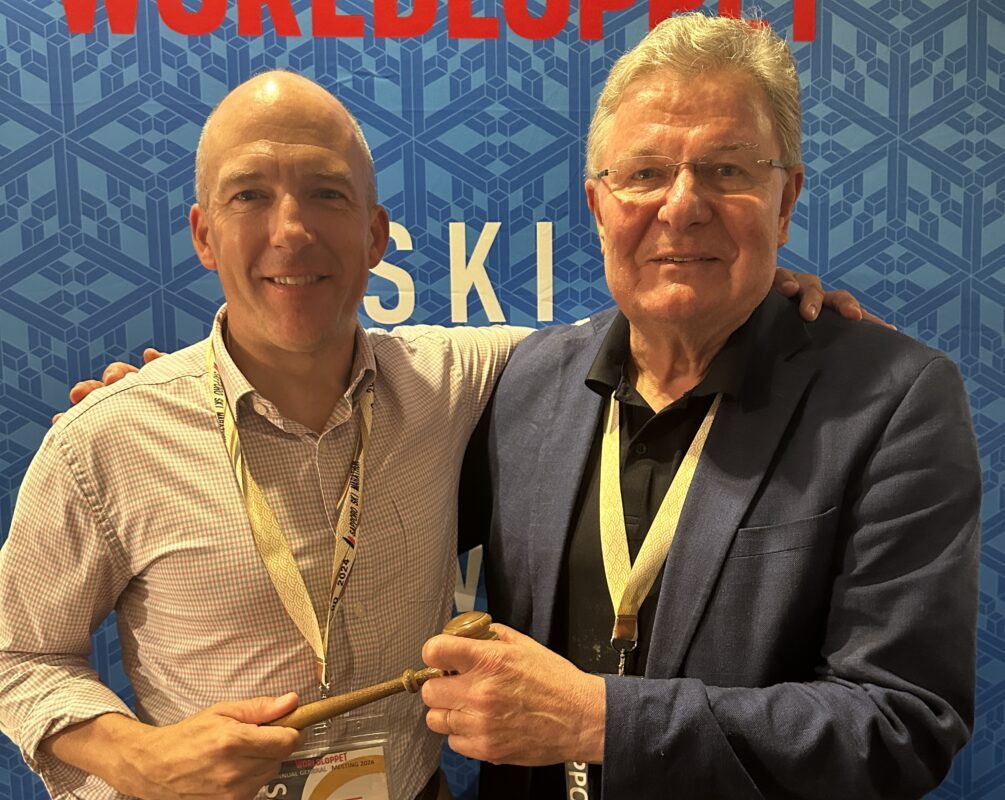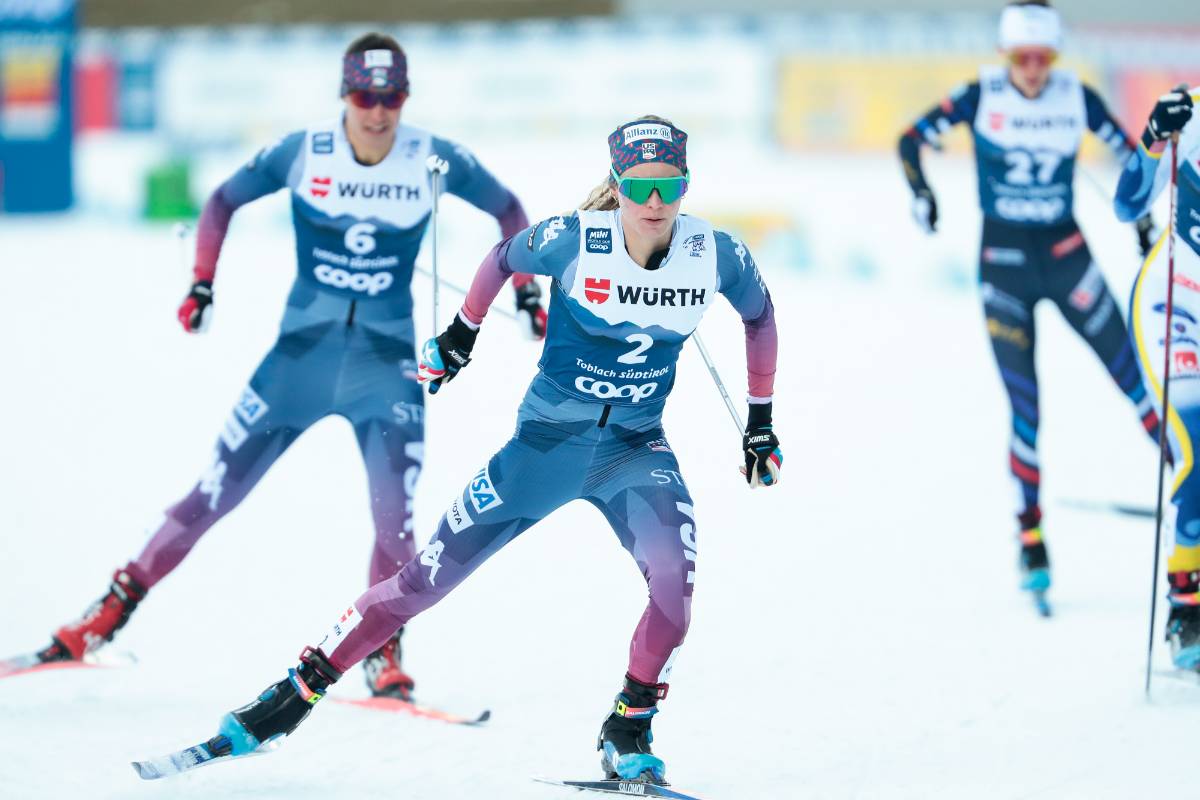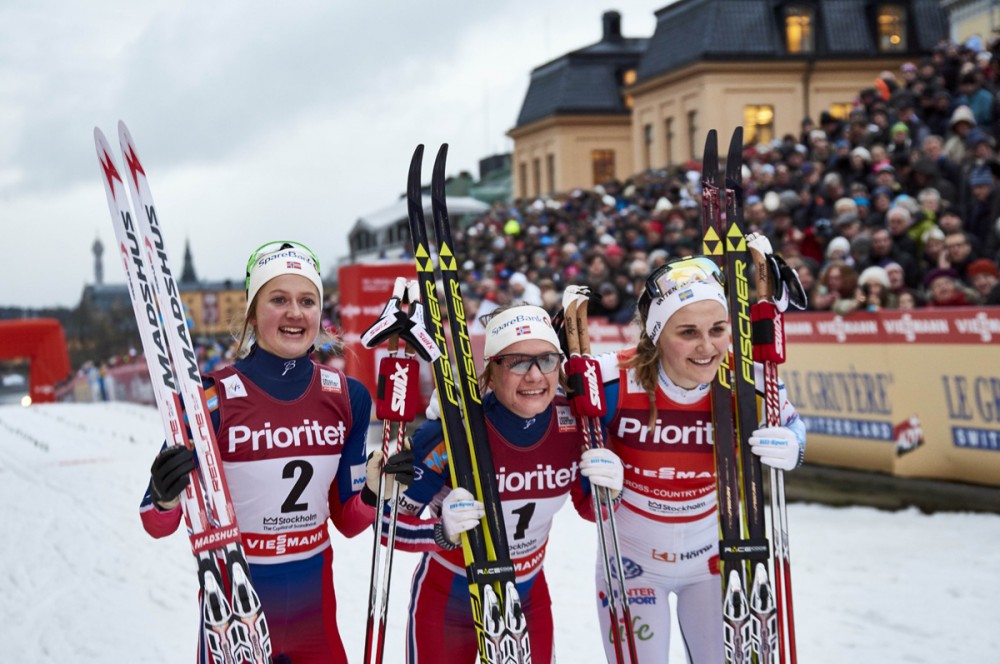
Thursday’s women’s 1.2 k classic sprint in Stockholm was a royal affair.
The World Cup, with all its high-tech wax and made-for-television city-style sprints, made its home for a day in the heart of the Swedish capital. The roughly U-shaped sprint course, which featured a straightaway that double backed on itself after a tight and deteriorating 180-degree corner, embraced the historic Stockholm Castle- official residence of the Swedish Royal Family.
Yet, when she finally toed the line, Norway’s Maiken Caspersen Falla was the day’s sprinting queen. After setting the standard as the first qualifier in 3:10.31, she won the final in a speedy 3:09.38.
“My self-confidence is very high in classic sprinting, but I never go into it and think I’ll win,” Falla told Norwegian daily VG. “Today I felt good.”
Teammate Ingvild Flugstad Østberg skied to second, a full 3.39 seconds back, while Sweden’s Stina Nilsson salvaged a host nation podium in third (+4.37). Sweden also secured fourth and fifth overall, with Hanna Falk (+5.22) and Jennie Öberg (+6.26). Russia’s Evgenia Shapovalova was the lone non-scandinavian in the final, skiing to sixth, 12.7 seconds behind Falla.
“She has a violent speed at the end,” Østberg told Norwegian broadcaster NRK of her winning teammate. “We others are not there. It is simply another league, but I’m satisfied with another second place.”
American Sophie Caldwell, currently sixth in the Sprint World Cup standings, was the best placed North American, finishing 11th. Her teammate Jessie Diggins skied to 15th on the day.
From the beginning, it was a tight qualifier. Only a single second separated first from eighth. And only 1.61 seconds back in ninth was the first North American qualifier, Caldwell. Diggins qualified 21st (+5.13). U.S. skiers Sadie Bjornsen in 37th (+8.32), Ida Sargent in 49th (+12.6), Jennie Bender in 56th (+18.5), and Caitlin Patterson in 58th (+20.77) were locked out of the heats, along with the lone Canadian, Andrea Dupont of Rocky Mountain Racers, who finished 52nd (+16.71).
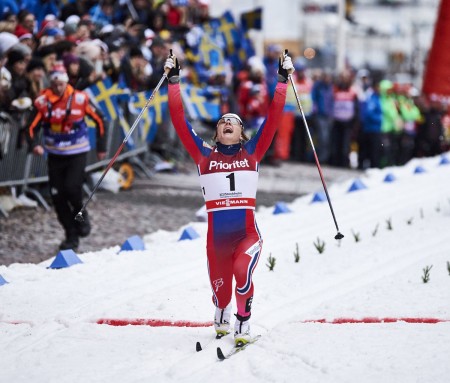
Queen for a day
Falla, the Stockholm Castle’s sprint queen, finished the day with a flurry of 1’s on the result sheet. Qualifying first, first in her quarterfinal, first in her semifinal, and first overall, Falla never allowed the tactics of others or the deteriorating soft course to stymie her efforts.
Østberg won the first semifinal in 3:11.45. That pace, although not blistering for the day, produced the two lucky losers advancing to the finals, Falk and Shapovalova.
Falla’s semifinal, out of which only she and Nilsson advanced, ran even slower. Falla stopped the watch in 3:12.68.
That time was not indicative of Falla’s reserves. Come finals, Falla had enough spare energy to dominate — she would beat that time by 3.3 seconds.
Moments after the gun, it was three skiers across for the first one hundred meters — Öberg, Østberg, and Falla. Those three set the pace, still three across striding up the first hill. Down that hill, Falla began to pull away slightly, as the group entered the 180-degre turn. Falla led out while Østberg settled into the back three or four spots, looking momentarily gassed.
Up and over a bridge, while Østberg moved forward, is when Falla made it her race.
Coming off that hill, and into the long uphill striding drag to the finish, Falla skied like a sprint champion, crossing the line uncontested- although she still stretched for the line at the finish, as if to make an exclamation point. Østberg came in second, Nilson in third.
With the win, Falla won her fourth consecutive classic sprint and her fourth World Cup classic sprint of the past five. Not only did she steal Sweden’s show with the win, she supplanted Nilsson for the top spot in the Overall World Cup sprint standings.
And the drama didn’t end there: to snag second, Østberg slotted in ahead of Nilsson in the classic tracks, a move that some on the Swedish team felt was obstruction. The team filed a protest to have the Norwegian relegated, but it was denied.
“I will not be bitter, but I think that the rules should be the same for everyone,” Nilsson told VG. “But I’m not going to get hung up on this. I’m happy with my race.”
Consistent? Nilsson was sore because in the previous World Cup sprint, in Drammen, Norway, she was relegated off the podium for obstructing Finland’s Krista Parmakoski. The move was similar to the one Østberg made on Thursday.
“Actually, I think it’s what happens in the sprint,” Nilsson’s teammate Öberg told VG. “But Stina Nilsson was disqualified in the previous race, and it was almost the same incident. And now I think it is a bit strange to apply it for one individual and not for another individual.”
Despite Falla’s comfortable win, it remains a tight race for the sprint overall. Falla is in first with 480 points, Østberg in second with 476, and Nilsson now in third with 474. Norway’s Heidi Weng, who sat out Thursday’s sprint, sits fourth overall, with 252 points.
With the six points separating first through third for the overall, the sprint crystal globe won’t be decided well into the Ski Tour Canada.
In a post-race interview with FIS, Falla spoke of her sprint authority.
“I’m always really nervous and just kept trying to do my best- I’m always telling myself, always do my best,” she said. ” Today, I didn’t feel that my power was so good as in Drammen, I was just thinking and focusing on technique and try to do like big movements, I really had a good focus on the technique. And I think that’s what’s important today with all the soft conditions.”
According to a FIS press release, Østberg, who just last Sunday raced a best-ever second at the Holmenkollen 30 k classic while Falla sat out, could feel those kilometers in her legs.
“I can say that this is the first time that I have felt some fatigue from previous racing,” she told FIS. “The 30 km was tough last weekend and I think I felt it in the finals. I am happy for Maiken. She was better than I was today and I can’t believe that it’s another podium for me this season.”
Nilsson, who before this race was leading the Overall World Cup sprint standings, acknowledged Norway’s strength.
“It was great to race in front of the home crowd. I tried as hard as I could but Maiken and Ingvild were stronger, but I am happy with how it went today to be on the podium again,” Nilsson said according to the FIS press release.
If Nilsson remains in the overall hunt, in the 19 years since the inception of the sprint World Cup, she could be the first Swedish women to win the sprint crystal globe.
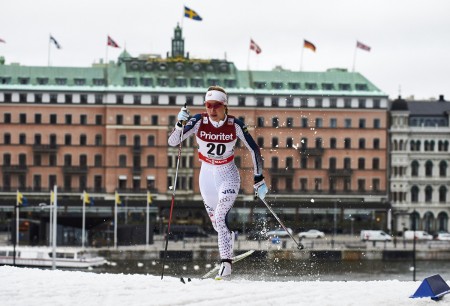
Peaks and Valleys for the U.S.
Caldwell led the U.S. results.
In an email, she wrote the Stockholm sprint course was a brute. “The course was extremely difficult not necessarily because of the terrain, but because of the lack of recovery. I liked that the hills were a little steeper and the flats were a little flatter than the course in Drammen. That played more to my strengths. Because of the slow conditions, you basically had to work all the downhills and there was very little time to recover.”
Her 11th overall included a win in her quarterfinal heat, further evidence that she is emerging as a top sprinter in any race. “My strategy in the quarter was to hop in behind someone fast and to try to conserve some energy for the final stretch. I think it worked out quite well, but it was a really hard effort.”
That first place quarterfinal effort sapped her. “I was definitely feeling a little tired in the semi,” Caldwell wrote.
“I chose to go with skis that kicked really well and I think that worked well in my quarter before I got tired, but in my semi it was a quick pace from the beginning and maybe my skis were gliding a little slower and kicking a little better than others, but I didn’t have the energy to stay with the fastest people on the flats and downs.” In the closing half-kilometer of her semifinal, won outright by Østberg, Caldwell faded — she finished sixth (+9.93).
Caldwell plans on racing this Saturday’s 5 k classic in Falun, then a skate sprint in Lahti, Finland on February 20th. After that, it’s a flight back Stateside for Ski Tour Canada prep. During all that time, while Caldwell focuses on what she can control, the FIS score keepers will be updating the tally for the sprint overall standings. “I try not to pay too much attention to the standings,” Caldwell wrote. “I feel like the best thing you can do is go out and race your hardest each week and getting hung up on things like points or rankings can only take away from that. I’ll be where I’ll be at the end of the season, but I’m more focused on each race as a new day than an overall ranking. Before this season, I sat down with Matt to write out some goals. I suggested top ten in the sprint standings at the end of the year and he said “how about top 5?”. I don’t know if I’ll end up in the top five at the end of the year or not, but knowing that I’ve been flirting with being in the top 5 at any point during the season is something that I will be proud of.”
Diggins, placing 15th, was also a qualifier. She remains happy with her improving classic skiing.
“I was psyched to qualify, especially as classic sprinting is traditionally my worst event and I’ve been working so hard to improve my technique and power,” Diggins wrote in an email. “I went for kick over glide today which was a gamble and the double poling was nuts as the tracks were falling apart- it made for an exciting day! … It’s always a good day at work when you get to race around a royal palace…can’t ever overlook how cool it is to be here!”
Bjornsen, who skied to 37th, felt her day could have been improved upon, but she remains forward thinking as her consistent season progresses.
“I have been struggling with my classic skis a lot this year, and today I tried a new approach,” Bjornsen explained in an email. “Unfortunately it didn’t work out, and I wasn’t able to get my brain to commit to the change. Sprint racing leaves no room for error, so I was on the wrong side of the error today.”
After the Stockholm sprints, Bjornsen sits 14th in the Overall World Cup.
“Fortunately, we have many races in the year, and so it is never effective to spend too much time focusing on a dip,” she wrote. “I know I classic ski in the top ten, and I know I know how to kick a classic ski. The two most important things to remember looking forward to what is coming next!”
Ida Sargent’s is a name usually in the points on classic sprints days. Having planned to start last Sunday’s Holmenkollen 30 k classic, she pulled out due to illness. In Stockholm, where she finished 49th, she was still recovering.
“Today was very frustrating for me and I was definitely hoping for more,” Sargent emailed. “I love racing in Stockholm and it’s my favorite city sprint but I unfortunately didn’t put one together today. I got sick last week and today was the first day back to training for me so I felt asleep during the qualifier. Normally I’m toeing the line of blowing up in the qualifier but today after not having done any intensity in over a week, I couldn’t get going and couldn’t find my normal pop. I also did not do a good job testing my skis today and struggled on the last uphill. I wanted to have fast skis with so much double poling in the course but I felt like I was spinning my wheels and running in place on the last uphill. Our techs did a great job with skis but I need to improve my ability to test my skis in the stressful situations of the city sprints. It was still a fun atmosphere and I’m looking forward to getting in some more training and racing this weekend to feel like my normal self again!”
Placing 58th, Caitlin Patterson explained in an email that she came away Stockholm with a learning objective. “I felt fairly good physically and had a good warm up, but during the race I allowed myself to get bogged down in the deep slush and I know I lost time on many of the transitions. It wasn’t my best of races but certainly there are many things I can learn from evaluating my own performance as well as watching the top athletes cruising around the course, making that slush look far more ski-able than it felt.”
Bumped up to the World Cup, Patterson steamrolls ahead in venues effusing both rarefied old world ski culture and the modern world’s quick urban tempo. “It’s hard to even describe it, such a juxtaposition of chaos with the structured format of a ski race, all with a spectacular old-city backdrop,” Patterson wrote of her time in Stockholm.
Racing continues on Saturday in Falun, Sweden with a women’s 5 k and a men’s 10 k classic.
-Chelsea Little contributed reporting.
Jason Albert
Jason lives in Bend, Ore., and can often be seen chasing his two boys around town. He’s a self-proclaimed audio geek. That all started back in the early 1990s when he convinced a naive public radio editor he should report a story from Alaska’s, Ruth Gorge. Now, Jason’s common companion is his field-recording gear.


